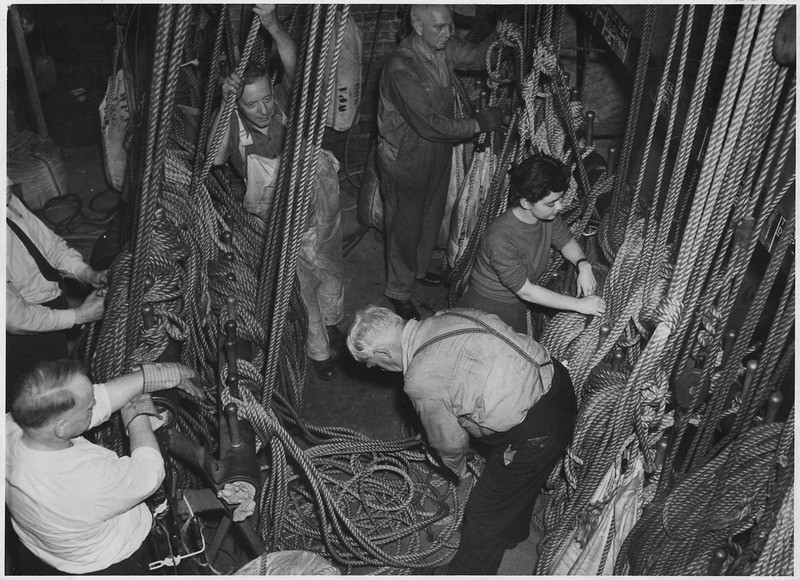While International Alliance of Theatrical Stage Employees (IATSE) members prepare for a national strike authorization vote, we talked to a local stagehand and member of IATSE Local 484 about workplace issues for entertainment workers in Austin and why they are considering striking. The transcript has been lightly edited for length and clarity.
What is your job? Can you describe your day-to-day?
I am both a special effects fabricator and special effects technician. For 5 to 6 days a week I am either in a studio and build whatever the effects department needs (building and making tools and machines), or I’m on a set running the machines that I build or helping the crew with special effects.
A regular work week is usually 12 hours a day, five days a week on studio. But working on set is usually when our hours are kind of chaotic. I’ve had issues with them disrupting personal commitments in my life just because if they need you on set for a particular time, you can’t really turn that down. The show that I am working on right now hasn’t been too bad, but I’ve worked previously on sets where the hours are a lot more grueling.
Regular working hours on the show is about 60 hours a week, but a lot of the older folks who work with me have been tempered by the industry, so the hours are normal for them. There was one movie that I worked on that had me do 16 hours a day for seven days a week. Compared to my coworkers who are kind of veterans in the industry, I’m kind of the new guy. Although the show we’re working on right now isn’t that intense, I have seen the conditions that are being addressed in the negotiations. If a show decides to do 10 16-hour days in a row, it is well within the rights of the show to do that as long as they respect the turnaround time.
Last season was pretty brutal. There was one point where we did 14 to 21 days straight — no weekends — and those would be like 12–14 hours a day mixed in together.
Why did you join IATSE?
I joined for political reasons. I’ve always been a supporter of groups that support labor. And I also joined for the benefits that come with being a union member. I have never had an employer that gave me health insurance and all of that comes with the union.
Who do you work with on set/studio?
Almost everyone I work with is in the IATSE 484 Local or in the Los Angeles 44 Local. The Austin branch has shrunk overtime but recently it’s starting to grow. Film is starting to come back to Austin.
Most of the big production companies like AMC are based in LA so they have contracts with 44. Whatever project that they do wherever the film or show is that they have to have workers from 44.
What challenges do you anticipate coordinating a strike nationally?
I don’t think it will be challenging to coordinate a strike. I think everyone’s just ready to go. I don’t know anyone who’s against it. I mean it’s hilarious — in the special effects department I work with a lot of hardline conservative Trump guys and even they are just like, “yeah, let’s fucking do it.” It’s interesting to contrast their thinking that “The producers earn what they make” and “well, they can’t treat us like shit.” I think the only people who are really against the strike are people who are about to retire and anticipate the strike throwing off their plans for retirement. They’ve worked in the industry for about 25–30 years, so on a selfish level I can understand.
Can you describe the voting process?
We need 75% yes votes to authorize the strike. That won’t necessarily mean that a strike will happen but it will authorize a strike. We’re supposed to vote by email but I haven’t gotten an email with anything with boxes that say yes or no.
Who is your target? What are the terms of this negotiation?
So, AMPTP [ Alliance of Motion Picture and Television Producers] is our “enemy.” They’ve been ignoring our terms of the negotiation. In 2020 when all of us were laid off, including me, the producers — while we were all at home streaming — were making huge numbers. In 2020 while everyone who worked for them and worked on these projects were getting nothing sitting in our houses, they were off having the most profitable year in, I think, recent history.
Of course they were making tons of money while many of us were out of work. In the contract negotiations, this point has been brought up to compensate and adjust wages with how much the income stream has grown. And apparently we’re not getting our fair cut of it as workers.
How can we support y’all in the leadup to the vote? And during the strike?
If this strike does happen and goes on for a couple of weeks, then there’s going to be a serious drop in content because the union has their hands in every single show that you watch. And if your average American who’s not informed on what’s happening hears that “oh, workers are striking so they can get more money and that’s why you’re not getting Spiderman 16”, it’ll get framed in a way that’s like, “oh these workers are greedy so you won’t get to watch new CSI.” I guess the thing to do right now is to talk about it and inform people because we need people to know that this is happening not because we’re greedy shitheads but because this is for a legitimate cause — a legitimate labor dispute.
Working-class people are the vast majority in Central Texas, and yet their issues and interests are almost totally unrepresented in the local media. We’re trying to change that! Do you have a workplace story or editorial you’d like to share with us? Email us at redfault@austindsa.org!

